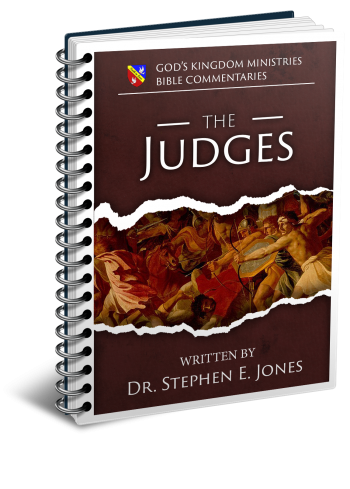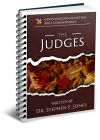Latest Posts
View the latest posts in an easy-to-read list format, with filtering options.

Two books in one. The first book is how the Judges themselves are named prophetically to give a message of Sonship. Book 2 is a commentary on the last 5 chapters of the book of Judges, presenting examples of how Israel was lawless after the death of Joshua.
Category - Bible Commentaries

Gideon had many wives who bore him seventy sons (Judges 8:30). One of them was Abimelech, whose name is translated in various ways: “My father is king,” or “father-king,” or “father of the king.” No doubt either Gideon or his mother gave him this name, which, if translated as “My father is king,” suggests that Gideon was seen in some way as a “king” at the time of Abimelech’s birth.
At the very least, Abimelech’s name seems to have instilled in him a growing sense that he himself was destined to be king—as if he were descended from royalty. Gideon himself can hardly be blamed for this, for Judges 8:22, 23 says,
22 Then the men of Israel said to Gideon, “Rule over us, both you and your son, also your son’s son, for you have delivered us from the hand of Midian.” 23 But Gideon said to them, “I will not rule over you, nor shall my son rule over you; the Lord shall rule over you.”
From this we see the beginnings of the monarchist party in Israel, which desired to be ruled by a king. The desire for a king came to fruition in the time of Saul, who became Israel’s first well-established king. But as we will see shortly, Abimelech ruled a good portion of Israel for three years.
When Gideon died, Abimelech, whose mother was from the town of Shechem, desired to be the first king of Israel. Abimelech went to his mother’s relatives in Shechem and convinced them that it was better for one man to rule Israel than to have seventy sons of Gideon divide the nation among themselves. It seems that some of Gideon’s other sons were also making plans to become king. In the guise of uniting Israel, Abimelech brought division and strife.
Abimelech’s relatives agreed, “and they gave him seventy pieces of silver from the house of Baal-berith” (Judges 9:4) to finance his plan. Abimelech then hired seventy ruffians to kill his brothers. The plan nearly succeeded, but the youngest son, Jotham, hid himself and thereby managed to escape (Judges 9:5).
Shechem (now called Nablus) was situated between Mount Gerazim and Mount Ebal. In the last days of Moses, Mount Gerazim had been the place where half of the tribes of Israel had stood to bless Israel, while Mount Ebal is where the other six tribes stood to curse Israel for disobedience (Deut. 27:12, 13).
After Jotham escaped, he hid for a time and then returned to the top of Mount Gerazim and laid a curse upon Abimelech for murdering his brothers. Jotham essentially removed the blessing of Gerazim and replaced it with the curse from Mount Ebal. One of those curses was directly applicable to actions of Abimelech, for Deut. 27:16 says, “Cursed is he who dishonors his father or mother.”
Jotham told a parable in his speech on Mount Gerazim (Judges 9:7-15). He told how the trees wanted to anoint a king, so they asked the olive tree to reign over them. The olive tree did not want to leave its “fatness” (i.e., oil), so they asked the fig tree. The fig tree did not want to leave its sweetness, so they asked the vine. But the vine did not want to leave its new wine which brought cheer, so they finally asked the bramble, which accepted their offer.
15 And the bramble said to the trees, “If in truth you are anointing me as king over you, come and take refuge in my shade; but if not, may fire come out from the bramble and consume the cedars of Lebanon.”
This parable insulted Abimelech, essentially calling him a bramble (atad). The bramble was a buckthorn, a thorny bush that had strong roots and could pierce those who brushed up against it. The olive tree represented Israel (Jer. 11:16); the fig tree represented Judah (Matt. 21:19); and the vine represented the unified house of Israel which God (through Joshua) had planted in the “vineyard,” that is, the Promised Land (Isaiah 5:2).
Abimelech was none of these, Jotham said, for he was unworthy of the throne of Israel. He was just a bramble.
As a son of Gideon, Abimelech was of the tribe of Manasseh (Judges 6:15), which had not been given the promise of the scepter. Manasseh means “forgetful,” and his name prophesied of two things: that the Israelites would forget their father’s household (Gen. 41:51).
In long-term prophecy, after the tribes of Joseph were sold into captivity to the Assyrians, they were to forget their identity as Israelites and become “lost tribes.” Secondly, they were to forget the true God during their captivity and adopt other gods during their long tribulation period (Deut. 28:64).
In the days of Abimelech, the Israelites forgot God and turned to idols (Judges 8:33). Abimelech himself was financed with silver from the treasury of Baal-berith (Judges 9:4), which put him in an alliance with Baal. Baal-berith literally means “Covenant with Baal.”
Hence, Jotham’s curse upon Abimelech was very real, and we soon learn from the rest of the story that God took it seriously. By going to Mount Gerazim, where the six tribes of Israel had stood in the divine court to bless Israel when they were in obedience to the law of God, Jotham essentially appealed to the divine court for justice to be done. His case was heard, and justice was indeed meted out upon Abimelech’s head, for we read Judges 9:23 and 24,
23 Then God sent an evil spirit between Abimelech and the men of Shechem; and the men of Shechem dealt treacherously with Abimelech, 24 in order that the violence done to the seventy sons of Jerubbaal might come, and their blood might be laid on Abimelech their brother, who killed them, and on the men of Shechem, who strengthened his hands to kill his brothers.
God sent an evil spirit into the situation, much like He did many years later to King Ahab in order that he might die in battle (1 Kings 22:23). The evil spirit caused the men of Shechem to work against Abimelech, so that he would lose his power base.
First, God allowed Abimelech to destroy Shechem to judge them for killing the sons of Gideon (Judges 9:45). In the next battle (against Thebez), Abimelech himself was killed. Judges 9:53-57 says,
53 But a certain woman threw an upper millstone on Abimelech’s head, crushing his skull. 54 Then he called quickly to the young man, his armor bearer, and said to him, “Draw your sword and kill me, lest it be said of me, ‘A woman slew him’.” So the young man pierced him through, and he died… 56 Thus God repaid the wickedness of Abimelech, which he had done to his father, in killing his seventy brothers. 57 Also God returned all the wickedness of the men of Shechem on their heads, and the curse of Jotham the son of Jerubbaal [i.e., Gideon] came upon them.
The curse of Jotham was based on “the wickedness of Abimelech, which he had done to his father,” according to the curse of the law in Deut. 27:16. It is interesting to see how prophecies can be fulfilled in different ways at different times in history. In this case, the prophecy of Joseph in naming his son, Manasseh, prophesied that Abimelech would forget God; Mount Gerazim and Ebal provided the foundations of divine judgment according to the curse of the law.
Finally, Shechem itself provided the finishing touches on the prophecy, for it was the site of an earlier act of violence. There the sons of Jacob dishonored their father by slaughtering all the men of that city after they had been circumcised.
Gen. 34:26 and 30 says,
26 And they killed Hamor and his son Shechem with the edge of the sword, and took Dinah from Shechem’s house, and went forth…. 30 Then Jacob said to Simeon and Levi, “You have brought trouble on me, by making me odious among the inhabitants of the land, among the Canaanites and the Perizzites; and my men being few in number, they will gather together against me and attack me and I shall be destroyed, I and my household.”
The story of Shechem provides us with background to help us understand the spiritual and prophetic implications of Abimelech’s murderous attempt to become king of Israel.